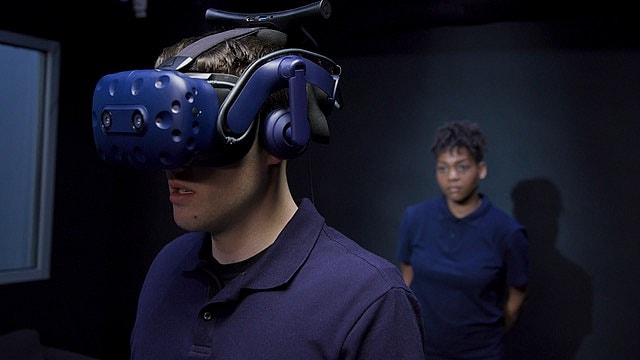Morehouse College’s National Training Institute on Race and Equity, along with the school’s Culturally Relevant Computer Lab have partnered with Google’s Jigsaw to spearhead groundbreaking technology aimed at training police through the lens of virtual reality.

“This technology, in combination with strong anti-bias training, has the potential to reduce racial and ethnic disparities in policing,” Dr. Bryant Marks, associate professor at Morehouse College and founder and principal trainer at the National Training Institute on Race and Equity, tells theGrio.
Marks takes pride in this work especially since he knows first hand the biases that could come from policing. As a young college graduate he was profiled and stopped while in New York City. “I’ve been on the receiving end of what I consider to be a bias stop and bias language,” says Marks.
The new program is called ‘Trainer,’ and it puts officers into virtual reality scenarios that teach de-escalation techniques through advancing communication and critical thinking skills. One of the primary goals is to combat bias and, for their part, Google Jigsaw has a pool of talented engineers helping to develop the program.

“Our goal at Jigsaw largely is to use technology to intersect different threats in society and we zeroed in on public safety and wanted to see if technology could be used as a tool in helping the overall issue,” says Sameer Syed, lead partnerships manager on the Trainer project.
Kevin Rabsatt, lead software engineer on the trainer project tells theGrio, “We thought Morehouse was a great fit to move this program forward, so we built the platform so that others can add to it and determine how they can actually use it and make an impact with it.”
At Morehouse College, the Culturally Relevant Computing Lab and the National Training Institute on Race and Equity will study Trainer’s effect on officers’ empathy toward Black Americans and will leverage the technology to strengthen anti-bias law enforcement training, in which students can serve as research assistants and training co-facilitators.
“We have spent a lot of time training small town police departments that don’t often have a lot of diversity in their community. So this program helps with facilitating how to approach someone of color say in a traffic stop or in a convenience store,” says Marks.

For context, in the days following the murder of George Floyd, a PBS Newshour-NPR-Marist poll revealed that nearly half of Black Americans reported to have very little or no confidence that police officers in their community were not bias to people of different races. Meanwhile, a poll of all Americans resulted in only 35% of pollsters saying that police officers in their communities treat Black and White people equally.
Morehouse, the nation’s only all-male and Black higher education institution seemingly is the proper fit for this type of work. The students and faculty that are driving this partnership with Google’s Jigsaw are ten times more likely to be stopped by police and are more likely to experience racial profiling and/or bias.
According to Marks, the training police officers receive from Morehouse could be a pivotal turning point on the interactions between police and communities of color.
“We can take what we learn from this training and offer valuable needed solutions to institutionalized bias,” Marks added.
Since the start of the school’s Race and Equity Training Institute, roughly 45,000 police officers have been trained across the country. The hope is to continue to do more training through virtual reality and what’s learned and obtained through the virtual world can provide life-saving tactics in the real world.
Kelsey Minor is a two time Emmy award-winning freelance journalist based in New York City. You can follow his work on Twitter @theKELSEYminor.
Have you subscribed to the Grio podcasts, ‘Dear Culture’ or Acting Up? Download our newest episodes now!
TheGrio is now on Apple TV, Amazon Fire, and Roku. Download theGrio today!

